#i didn’t even get to talk about the theme of toxic masculinity vs healthy masculinity
Note
I know next to nothing abt utena but I. I kinda am extremely curious abt the utena vs mcu comparative analysis? if you feel like sharing lmao absolutely no worries if not
I love all of you because I will post obviously bait and someone will always indulge me in asking about it. NO I don’t want to unprompted just start rambling about my opinions, YES I will share them though. I will make this as short as possible because I can talk about Utena all day. I will add a disclaimer that I don’t super like the MCU so I’m very sorry to any MCU fans, Winter Soldier was good. Slight, vague spoilers for Utena ahead.
TL;DR: MCU is constantly selling feminism in the form of palatable #bossbabes and Strong Female Characters, while Utena’s form of feminism is a more systematic and nuanced interview of how the patriarchy limits, exploits, and controls women. It posits that a woman CANNOT be a #bossbabe while she’s within that system, and only by leaving it can she find independence and identity. MCU is sponsored by the Air Force.
So for the uninitiated, Utena is a magical girl anime that I’ve been jokingly calling Evangelion: For Her. It deconstructs magical girl anime and fairy tales, and critically examines Japanese society, the patriarchy, heteronormative culture, and IN MY OPINION boarding schools. It deals with themes of trauma, toxic relationships, toxic masculinity, gender non-conformity, queerness, abuse, maturity, coming of age, gender roles, memory, and narrative.
I’ve joked recently that Tumblr would find Utena problematic if it actually talked about the show beyond the killer aesthetic and sword lesbians. Every female character in it is obsessed with men. Most of them are in abusive, or at least toxic, relationships. It has several gender nonconforming, queer women, who view gender nonconformity as adopting the role of a man in society and thereby idealizing/controlling/abusing women, as men do. Every character is a hugely complicated person who hurts others. Men control women and women are either subservient and controlled by men, or they use their position of assumed subservience to manipulate men, or they attempt to regain power by taking the role of men.
On the flip side. Utena demonstrates how every character is turned into this through the rigid and restrictive nature of (it’s Japanese, so Japanese, although it’s broadly applicable) society. Women who do not fit into these pre-set molds are punished and ostracized. Young boys are groomed by older men in order to fit these abusive molds, and otherwise well meaning men hurt women because they are not taught how to interact with women in healthy ways. The show is basically about how society takes the genuine need for love, intimacy, and human connection among children and beats them into societally accepted molds that keep power in the hands of powerful men. The patriarchy is ultimately a tool of powerful men that abuses and controls both men and women. Ever hear of no ethical consumption under capitalism? Try no ethical love under the patriarchy!
So, no, Utena doesn’t really have a lot of ‘strong female characters’. But that’s really kind of the point - how can a woman be strong in this system? When a woman tries to gain strength, does she just try to imitate masculine values that we’re brainwashed into perceiving as strength? Is masculinity healthy? Can Utena really be gnc, or will a gnc woman never be accepted as a man by a society that profits off the victimization of women?
I’m not asking the MCU to analyze all of this, because they’re blockbuster movies and I don’t want or need them to get #deep. However, superhero movies will never look at the systematic and societal structures that build heroes and villains so long as the nature of superheroes inherently hinges upon the ‘Great Man’ system (basically an obsession with heroes and salvation through singular men instead of communities and movements). The MCU Spider-Man movies were so frustrating about this: it goes through the effort of saying that capitalism and injustice created the Vulture, but all that does is make a sympathetic villain - it never goes so far as to say that Peter is being fed into this system (by Tony Stark) like meat into a meat grinder that continues to prioritize the special over the collective. I don’t even need to get into Far From Home. The MCU constantly acknowledges these injustices (the way it acknowledges that the Air Force in Captain Marvel is sexist and racist) but it twists around that acknowledgement into assertion that superheroes and good guys CAN exist in this unjust system, and that they can utilize the power of this unjust system in order to provide salvation. Utena has Japanese Buddhist roots over this Christian ideal of the saviour/messiah: it encourages saving ourselves, and says that we cannot be saved by others, only aided and guided in that journey.
Captain Marvel cannot be a ‘feminist’ film, no matter how much it celebrates Carol for embracing her individuality and autonomy in a discriminatory system, so long as Carol remains within that system. In contrast, the only way that Utena was able to live in gay happiness with Anthy was by rejecting the patriarchy, structure, and society completely. Carol is a shining, premier, ‘ideal’ example of a woman in the Air Force - tough and independent yet obedient and responsible to her system. Utena is also masc and gnc, but it actually explores how performing that masculinity isn’t a repudiation of the system, it’s just striving to attain status as the oppressor instead of the oppressed (absolutely crucial note that Utena doesn’t strive to be a man, she strives for masculinity). The #girlbosses in Black Panther are characterized by their complete and total loyalty and lack of ambition to authoritarian male figures and autocratic systems (Black Panther is really good and I like it a lot, this isn’t a criticism). Judi in Utena is also completely obedient and loyal to the male-dominated structure of the Student Council, but it’s shown as preventing her from accepting her lesbianism and pursing her desires. Black Widow, #girlboss extraordinaire, is devalued as a woman through her infertility and this is completely played straight and uncritically in a move that’s stunningly 1970s. Nanami in Utena (metaphorically) is confronted with her perceived lack of suitability for maternal life - and how the reason why she’s desperate for this is because it’s the promised unconditional love she never received. This isn’t even getting into the men - Tony Stark using tools of war to end war, which is an oxymoron. Peter Parker’s divorce from his working class roots into mindless imitation of authoritarian paternal figures and him literally being handed the cutsey drone strikes. Women in the MCU are ‘cool’, women in Utena are complex, flawed, and nuanced.
We know the MCU isn’t woke. I don’t want it to be woke. But it keeps on pretending to try and it’s frustrating me. It continually just gets enough there to make me think about it and give the shiny sheen of that feminism while refusing to engage meaningfully with what they’re doing. I’d rather they didn’t try at all, because they consistently raise the question (hey it’s fucked up that the working class is getting screwed over and the Vulture’s doing what he’s doing for a reason!) and then refuse to answer it authentically or genuinely (but he’s evil so we don’t gotta touch that). I’m not gonna use the word pandering, but...that #girlboss shot in Endgame, come on...
Utena meaningfully treats the women as women who Live In A Society, and how that fucks them up, and how the only way they can be free is if they realize there’s no wizard behind the curtain, recognize the injustices, and repudiate the game. MCU says that a woman can be liberated and strong if she achieves specialness and strength within the system - if she ‘wins’ the game. But women don’t win this game. That’s the point of the game. Because when women win, men perceive themselves as losing, and that’s unacceptable. Captain Marvel and the MCU is a consolation prize for what women are consistently denied: complex and flawed characterizations.
I’m normally uninterested by #feminism but Utena gets it. Thanks for the ask!
#revolutionary girl utena#utena#marvel cinematic universe#meta commentary#mcu critical#TERFs do not interact with this post utena does not say men are inherently abusive it says that men are also damaged by toxic masculinity#utena did not give us touga saionji and miki to say that men are not hurt and abused by powerful people#i'm watching wandavision and I will say that it is the CLOSEST look the mcu's taken since jessica jones into this#but it's still falling a little short for reasons i'm still mulling over#also i forgot to mention jessica jones but jessica jones is more about 'spooky one evil guy' then talking about rape culture#im sorry this is so long im incapable of being concise it's in my bio#i write about gender a lot but kinda subtley#i mean except for the roleswap series where I hit the reader in the face with a 2x4
181 notes
·
View notes
Text
13x20: “I don’t care what happens to me”-- Dean Worthless Winchester, John Winchester’s Death and Destiel
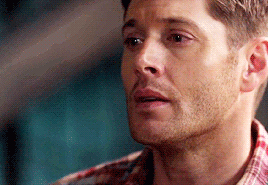
Oh my god!
I gotta say, 13x20 was an ANGSTY FEELSY amalgamation of meta and foreshadowing for the Big Finale Triad of 21, 22, and 23. It laid down S5 tones, key themes, and narrative direction, hoo boy!!!
I’m sorry I posted late! Time-of-month sickness was an interruption, yikes.
I’d like to start with the Dean & Sam final scene, then talk about the major culminating implications this Father-centric episode specifically holds for our beloved protagonist Dean Winchester the shackled child — the Man behind the Mask (which S13 has been a gigantic narrative mirror of) — and the Destiel narrative/Cas in relation to Dean’s arc and character disposition *rubs hands together*
Glynn & Co made Dean’s axel-swinging between communication and miscommunication pretty clear to me in the last scene of 13x20, especially regarding the dialogue that people thought was character regression into Brodependency.
After sleeping on it, I didn’t see the same scale of toxic codependency from seasons ago a la ‘there ain’t no me if there ain’t no you.’ It wasn’t mutual. I saw it as: 1. more from Sam’s end, and 2. Dean’s willingness to protect his loved ones (Sam and CAS, in bold) combined with letting go and the textual acknowledgement of his low self-worth carrying over from 13x05 (the low self-worth he internalized across 99.6798% of his life course).
Firstly, Dabb’s subverting S5.
He put independent Dean in S5 independent Sam’s shoes here, and it’s surely not a coincidence that Dean himself referenced their implosive S5 Michael-Lucifer mess: “Where we were last time we had front row seats”. S5 exhibited Dean’s Holding On vs Sam’s Letting Go, with lost Dean crawling to Lisa’s door and yeah, we know how that prickly-edged story went. It’s finally Dean Letting Go vs Sam Holding On. It’s indicative of S13 faithless Grieving!Sam re: Mary/Jack seeking his own emancipation and finding real introspective purpose away from the codependent strings he’s clinging to. We heard Sam’s “If we die, we die together”. Don’t fret, his current arc is constructed to get rid of this kind of thinking and move towards Faith!
Dean’s prepared to cut the codependent strings — already has via 12x22, and then in 13x05 (albeit in a suicidal grief-ridden manner. Speaking of, 13x20 this time shifted focus to Sam’s risk-taking re: Lucifer and the Apocalypse in itself. Unsurprisingly, we already witnessed this narrative train running in reverse -- early S13 Grieving!Dean and Functioning Sam swapped roles post-13x06 and in 13x11. Man, I am pumpin’ my fists).
Atop the bro dualism, Dean’s behaviour in 13x20 concerned me the most, saddened me the most, and intrigued me the most.
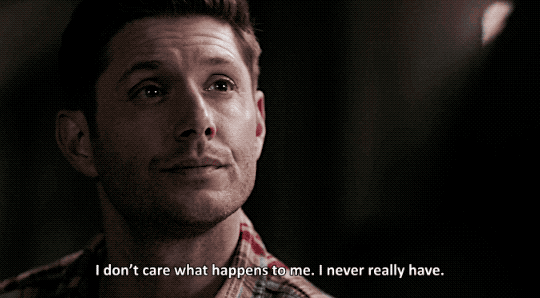
:’(
I may have yelled said that Dean has emotionally matured, eliminated toxic coping mechanisms, achieved an internal balance between his femininity and non-performative masculinity (acknowledged in 13x04; actively manifested in 13x16 onwards x, x), and gained a sense of non-combative communication and understanding (seen in 13x14), yet his low self-worth constitutes the biggest roadblock to his FULL personal growth.
Okay, I know you’ll exclaim: after Cas returned, Dean wasn’t depressed anymore!
Well, that’s accurate and relatively inaccurate. Dean’s low self-worth is the central facet of his characteristic development, and it does have a guaranteed correlation with depression. Yes, you can feel worthless without being clinically depressed, but worthlessness is maladaptive and contributes to feeling depressed --> Dean’s depression.
Dean’s case is a heartbreaking one. He’s been depressed for YEARS. He never really cared about what happened to him for YEARS = our Dean meta textualized in gloomy letters!!
Yes, the single individual -- the canon WIN -- that placed him back on the rails was Cas, his Everything, resurrecting from the dead. Cas’ return drastically mitigated Dean’s severe nihilistic depression (aka his rock bottom nihilistic grief when he lost Cas) BUT it didn’t necessarily fix his pre-existing depression.
S13 depicts Dean -- despite Cas’ bright presence -- as traveling the rails empty. There’s not enough coal to fuel his engine because he LACKS the mental faculties to appropriately cope re: trauma and give up his control. This is why he seems to oscillate between character progression and regression, and he still isn’t 100% HONEST and OPEN about his feelings. He’s keepin’ it in. There’s no healthy psychological unload taking place.
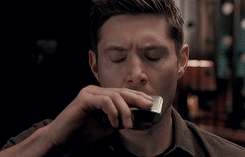
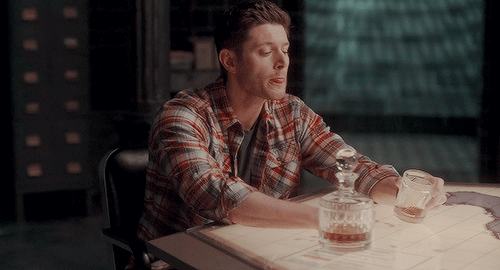
Case in point? Dean’s regressed to drinking the hard booze again; Cas FILLS the negative spaces (as he’s been doing throughout S13). Dean is not disclosing the whole truth -- not saying what he’s genuinely feeling (to CAS. I discuss it x, x, x).
Plus, Dean’s internal worries re: Death, the next apocalyptic war, Cas’ Heavenly plans, and his respective destiny/fate (Death’s “See you soon”) just exacerbate the personal instability he’s experiencing.
And then we observe Dean’s parental duty rearing its head:
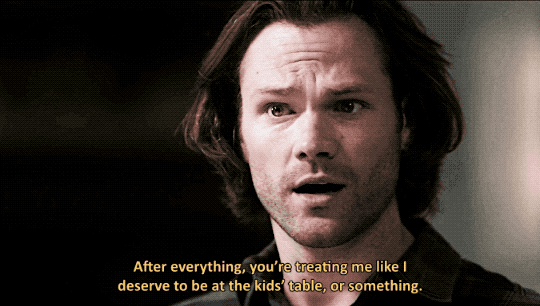
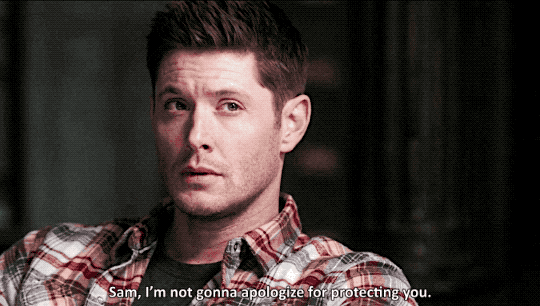
To me this is what reiterated the Brodependency being dismantled in late S12/S13 (12x22 and 13x12/15 in particular). Don’t get me wrong – Dean’s mostly let go. He was willing to leave Sam behind in 13x05 after losing the one person who textually means Everything to him.
Dean’s psyche is at a point right now where he AIN’T okay with Sam’s risk-taking. He questions his little brother’s half-baked plans and sympathizes with the close-to-here manic desperation (again, mirroring S5 and S13 Grieving!Dean), except Dean’s low self-worth puts him in the dark position: I’m doing it, all of it, for YOU (Sam and Cas) since I don’t value myself enough to do it for ME. He further says--

He obviously does, but us, the audience, know--in dramatic irony fashion--that this is NOT Dean’s entire truth.
He values his brother more than himself, and he values CAS more than himself. He cares about what happens to CAS. Nothing Else Matters. And we’re aware that Cas canonically occupies the highest pedestal in Dean’s life, which TPTB absolutely highlighted during Dean’s grieving arc, Cas’ return, and 13x16 onwards.
(In this scene, Dean continues to tell Sam what he’s NOT telling Cas. USE THE RIGHT WORDS.)
Cas is the love of Dean’s life, his Everything, and his Win. I mentioned before that losing Cas a second time would destroy him.
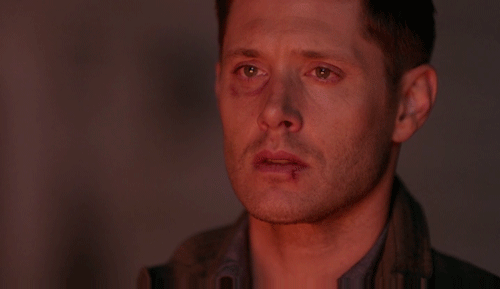
(**Dating 101: Dean therefore cannot establish a truly healthy, mutually interdependent relationship with Cas if he has low self-worth. He’s trying, but his personal losses -- more LOSSES than wins this season i.e. AU!Charlie/Mary/Jack in AU, non-confronted traumas i.e. Cas’ death, and insecurities cripple his ability to give Cas ALL of himself, out in the open!)
Although Dean HAS FAITH (Cas), the decisions he’ll formulate to protect/save Sam, Mary, Jack, and especially Cas aren’t exactly derived from mental stability. Keeping them safe is too paramount to Dean that the choices he’ll encounter could be questionable/dangerous, putting him in the line of (sacrificial) fire.
Sound familiar? It’s deliberately supposed to sound familiar!
Jack, TFW’s Unity/Balance symbol and characteristic mirror, even stated that ‘if he can’t keep others safe, what’s the use’?
Dean will make the penultimate save-the-world (read: save my family) decision ALONE regardless of Sam’s regressive wish to die together. And I wrote that his arc is now DIRECTLY paralleling S11 Casifer & Depressed!Cas’ S11/12 arc, especially (mis)communicative 12x19 --> 12x23 ‘I Have Faith’ Cas. There’s prevalent narrative symmetry in Dean’s arc (intrinsically linked to Cas’ arc).
“You, me, and Sam...we’re just better together” indeed, and this year’s season-ender should unite TFW like last season--unite Dean and Cas--in order to change their fates/defeat Death, but Dean’s decision will be an isolated one --> one that was foreshadowed as he faced expositional Daddy Issues™ Loki by himself. And Dean may not tell Cas, just like Cas hadn’t told Dean in 12x23 about his sacrificial act.
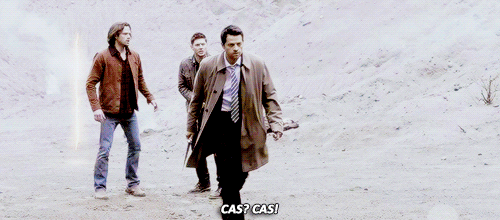
These vastly important storytelling threads ultimately conjoin with “I don’t care what happens to me. I never really have” as the PINNACLE of Dean’s 13-year long characterization; the progressive climax sparking his death/decay so that he can be reborn and revitalized aka THIS IS IT!! Dean’s impending death and self-sacrifice for his loved ones (CAS) = the ultimate catharsis in that S13′s narrative has finally approached the IRL scenario of 13x16 ghost kid (DEAN)’s release from father figure Bad Man -- from the negative influence of all the other literal (Loki, Odin, Lucifer, James Turner) and metaphorical (Asmodeus, Buddy, Michael) fatherly mirrors permeating this season. He’ll LET GO of everything that incarcerated him since he was 4 years old: his Blunt Tool role, control, manipulation, parental abuse and absenteeism, parental duty, the heteronormative patriarchy, and the long-standing trauma slapped on him by Alastair, Amara, and Cain.
He’ll burn the remaining pocket knife of all pocket knives tethering him to his past -- John Winchester x, x He’ll self-transform.
And Dean’s S13 death would fulfill the sacrificial Act of True Love (with Cas holding heavy weight in Dean’s decision for LOVE)--
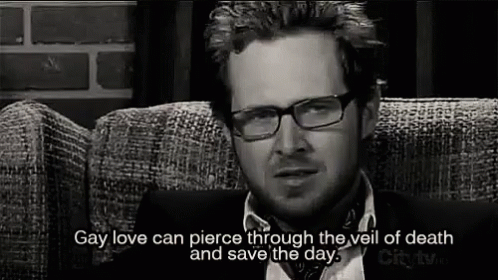
--and S14 Winning Him Back in the subverted flavour of S10. Romance tropes abound!!
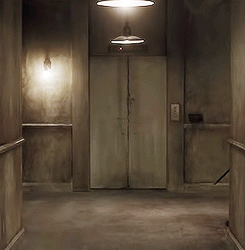
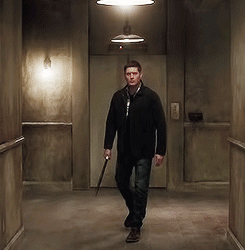
@thetwistedwillow and @sactownbrowns3 both ignited my stomach-churning feels. This is an extremely pivotal visual. The Michael-reminiscent sword and radiant halo-like lights atop Dean’s head? Yeah, set off HUGE Michael!Dean radars. Complete moral dualism with S10 Demon!Dean--selflessness vs selfishness. Free choice (saying yes to possession) vs stolen choice (demon transformation against his will).

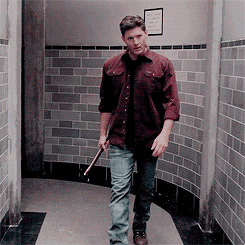
Secondly, as aforementioned, Dean’s harbouring a LOT of traumas he hasn’t mentally confronted, with Daddy Issues™ re: John Winchester (reflected via Dean’s solo faceoff with Loki) as his overarching undealt source of trauma.
Loki tells Dean: “The truth is, [Odin] despised me, but he was my father. I’m sure you understand. What would you do for your father?”
And Dean stabs Loki’s hologram. He stabs the metaphorical father figure who neglected his sons. He stabs another narrative embodiment of John’s ghost, foreshadowing that Dean’s death = John Winchester’s final death. It’s time to deconstruct and conquer his influence.
(Gabriel was an extended mirror of both Dean and Sam, too. Gabe, the little brother whom deadbeat Daddy Chuck never paid attention to. ‘Ah, big bros, right? Always think they know best’ Gabe, who stabbed and killed deadbeat Loki. Gabe, who subsequently ran away from home, was used and tortured beneath Asmodeus’ control, embarked on a revenge trip, and didn’t feel good about it. Dean and Sam themselves knew what it felt like to be manipulated. While it’s true that their traumatic experiences are subjective, they share common Deadbeat Father-adjacent life courses.)
What beautiful and consistent silent storytelling!!
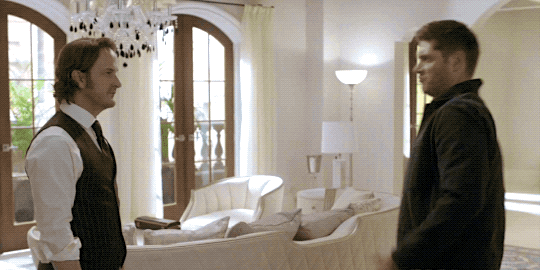
And oh look, narratively associated to this ^^ is the reappearance of Dean’s John-linked BAG OF EMOTIONAL BAGGAGE--

I can’t can’t can’t wait for him to let go of it PERMANENTLY!
And of course, Cas’ death remains his immediate significant source of undealt trauma (same links above: x, x, x)

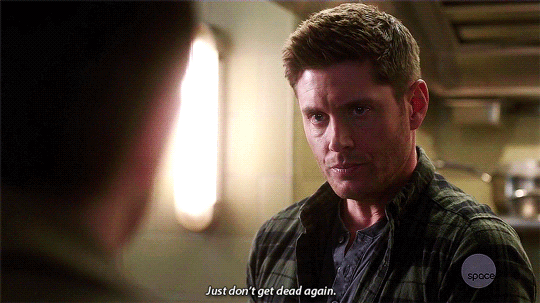
*looks at Dean’s serious, intense, and emotionally laden expression* *clutches chest tight* *blinks away tears*
I additionally wrote something about Endverse!Cas and D/C (mis)communication a few months ago which I feel is relevant again:
And we know HUMAN Endverse!Cas was representative of that, a sad, depressed, and hollow depiction of the wrong choices for the right reasons who festers (AND DIES), in part because of Dean’s wrong choices, and also because of his own consciously uninformed, narrow-minded choices that led to this literal apocalypse of mind, body and soul.
5x04 laid down what Cas (and Dean) shouldn’t become. If both Cas and Dean (TFW) continue to fail in learning their lessons regarding healthy interdependence (where control must become equality; ignorance must become understanding; intransigence must become compromise; stonewalling must become transparency; lying must become honesty; silence must become communication), Endverse will be their life.
Thankfully, they’re learning as of S13 onwards and I’m ECSTATIC. Slow but sure progress (13x15′s conveying the shift), yet they still have to use the RIGHT WORDS.
Endverse!Dean, who never gave up his control to Cas nor listened to him, was himself consumed by the NEED over the WANT and an authoritarian means to an end. He lost everyone. And Endverse posed an ultimatum for Dean (and Cas’ own characteristic progress): keep your control forever, and you’ll have one destination–no growth, no life, no freedom.
Full circle!

Dean Winchester must die so he can live.
And what are Dean’s WINS (plural) by dying? Saving people instead of losing people--saving Mary, Jack, Sam, and Cas. Saving the world. Reuniting his family unit. Interacting instead of performing. OUTING INSTEAD OF HIDING. HIGH DEPRESSIONLESS SELF-WORTH INSTEAD OF LOW DEPRESSIVE SELF-WORTH.
Better yet, Dean will undergo character development in relation to his loved ones (and Cas). With high self-worth, Dean’s capable of learning how to value HIMSELF independently. In turn, without personal obstacles he’ll learn how to sustain HEALTHY interdependent relationships and COMMUNICATION as well as learn how to WHOLLY GIVE HIMSELF to others (Cas).
Tell Cas he’s not expendable, Dean. Disclose the real reason YOU “needed him back”. Expose your feelings, choose Want over Need, and push away your rejection fears! Cas loves you dearly—let him know that his love for you is reciprocated. Nothing but good things ahead!!
Gosh, this post is way longer than I expected—thank youu for sticking to it! Circumstances shall get worse before they get better, and it’s totally necessary to ensure our characters meet the final demise of their prisons.
BTW, I still can’t believe we got a borderline blatant onscreen bi!Dean (and Cas insert) treat!! What’s by is by! Overall I’m incessantly praising Dabb’s spectacular work so far + Glynn and Rich Speight Jr’s craft in this ep!!
Very little sub is left in the text, my friends. TPTB are rendering years’ worth of meta increasingly explicit in S13. I can only HOPE and expect that 13x23/S14 brings us past the Point of Know Return subtextual boundaries and into full-blown textual narrative! Authorial intent EXISTS.
**I know, I know--S14 wasn’t confirmed as the last season and S15 is fair game. The plot accordion, as per usual, re-emerges with the slight overhaul/pullback of characteristic arcs and narrative plot due to season renewals, but I’m Endgame Positive that slow progress is SURE progress. Imho Dean and Cas are so close in saying everything from saying nothing. THE UNSAID WILL BE SAID.
Bracing myself for the last 3 episodes—they’ll burn us in awesome ways!!
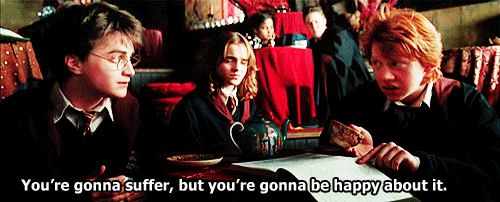
#long post for ts#spn s13#my meta#my stuff#destiel#character development#narrative#endgame destiel#canon destiel#textual destiel#bag symbolism#bags and emotional baggage#13x20#13x23#spn s13 speculation#silent storytelling#IN DABB WE TRUST#supernatural#deancas#parallels#dean is in love with cas#dean winchester#performing!dean#want vs need#miscommunication#communicate before it’s too late#USE YOUR WORDS#tw: depression#dean is bi#john winchester's a+ parenting
209 notes
·
View notes
Text
Free! vs. Toxic Masculinity
So I was thinking the other day about how people always project negative stereotypes on Free, accusing it of queerbaiting and shallowness and other things of that nature. I disagree with most of this, and wanted to take an opportunity to highlight something that I think Free does really well compared to other sportsani or shows primarily focused on guys. Something that I think sets it apart from other shows considered fangirl-bait. And that’s the way it deals with and confronts concepts of toxic masculinity.
I am not going to provide a whole explanation of toxic masculinity. If you want a full refresher, watch this. But for the sake of this discussion, it’s the idea that traits such as showing emotion, non-aggressive friendships and likes associated with femininity (flowers, love of fluffy things, children) are “feminine-coded” and therefore bad for a man to embrace. Toxic masculinity champions men who shun emotions, turn friendships into competitions and reject “girly” likes.
So how does Free handle this concept? Well, first I’d like to point out that I think part of the answer to this is why I reject the notion that Free (the show, not the marketing) is shipbaiting. I believe the intent of Free is just to portray relationships. It just so happens that these male relationships are different than what most audiences are used to when it comes to male friendships, and the result is behavior that people extrapolate to mean more. I’m not saying this extrapolation is wrong, just that I don’t believe it’s the show’s intent. Free wants to tell a story about friendship, about male friendship, about healthy, positive male friendship. And that’s something that simply just isn’t done often.
Most male friendships in anime are characterized by competition and that competition is viewed, in many cases but not all, as a negative thing. A thing that must be overcome in order for a deeper friendship to result. The push is that the characters stop seeing each other as something to overcome. You will find this in most shonen anime, which honestly has some of the deepest male friendships.
Free turns this concept on its head. Obviously, you have the deep childhood friendship between Makoto and Haruka, which is characterized by support and trust but without the senpai trope that is usually attached to male friendships of this nature. You have the friendships between Nagisa and Haruka, which should be the annoying shota and the tsundere, but Haruka thinks highly of Nagisa and really grows based on his insight. Again, there’s is not so much the senpai trope because as much as Nagisa idolizes Haruka, he also teaches him.
And then you have Free’s champion of rejecting toxic masculinity: Rin. Rin is a character defined by emotions. And while some are the typical masculine aggressiveness and competitiveness, he’s also known for his sensitivity, tears, and tendency to burst into flowery speeches about love and friendship. Rin is framed as your typical jock in his skill, build and even shark-tooth antagonist aesthetic. But his personality is anything but.
Rin’s tears are not mocked but embraced. They are viewed as a positive thing by other men. Haruka encourages them, to the point of smiling when he sees Rin shed them. Sousuke encourages them, even to the point of giving Rin space so he can cry. Rin openly cries at romantic movies, overt displays of friendship and sheer happiness. This embracing of male tears is why the odd line from Makoto to Nagisa in ES 13 feels so jarring. "Boys don't cry." I don't even have an answer for that one. It was just 0_o.
Yes, Rin is embarrassed and tries to hide his tears because Rin is still tied up in biases of masculinity, the same way he tries to defend himself when he's being too sappy, but that Rin can still bring himself to shed them is significant. Rin does have traces of toxic masculinity as a result of his character trope. Rin has grown up without his father and assuming he had to be "man of the house."
But Rin is also presented as the guy who loves flowers and romance, adopts stray cats and talks about dreams. Again, this goes very much against the image Rin presents as the jock bad boy. It's much different that the typical depiction of male friendships as dudes being jerks to each other even when they're bros.
But, Kitty, you cry, Rin is a jerk in S1 of Free. Right, you are. And this is viewed as an aberration to Rin's original personality and something that must be understood, and with help, overcome. That is the plot of S1. That Rin is the jerky rival is the trope. The twist is that Rin is not actually the jerky rival and is actually emotionally trouble and under the impression that his previous sentiments were wrong. Something he abandons in S1.
So supportive male relationships are the key to both the climax in S1 and in S2, with Haruka's anxieties. Which is nice to see and a theme that I hope continues in S3.
Then we have Rin and Haruka's relationship. This is probably my favorite part about how Free tackles toxic masculinity. Free takes the perceived main conflict of Rin vs. Haruka's rivalry (whereupon you expect it to resolve when Haruka wins) and makes it more about learning why the negativity of that rivalry is WRONG. So the conclusion to the conflict isn't a final match or even RH working together to defeat a bigger conflict. It's literally just resolving the negativity itself, which is Rin's fear of unimportance to Haruka and Haruka's inability to tell Rin how he really feels. In fact, this confused many original fans who expected the conflict to end with Haruka realizing he doesn't need to fight Rin and then walking away from the rivalry. But the show instead says it's not the rivalry that's the problem, it's the way in which the rivalry is expressed. Which was through toxic masculinity. Rin's need to defeat Haruka.
Once this problem is resolved, the rivalry is less about defeating the other and more about pushing each other to their limits. Which is a supportive rivalry.
Usually in sports anime, the conflict is resolved by defeating the rival and this makes the rival reassess the main and declare them worthy. This creates a deeper relationship that allows them to compete on a more even ground. But Free doesn't care about who wins. It's not about that. It's about the relationship of the characters. Which is why even though in S1, the characters win the race, they are ultimately disqualified. Because the results don't matter. What mattered was resolving the emotional conflict between Rin and Haruka.
And the end result is the extreme example of the opposite of toxic masculinity, which is Rin openly crying, showing physical affection and showing how happy he is to be with his friends again. It's not couched in any shows of feigned masculinity either. Rin doesn't get all flustered by his actions. He openly embraces them. None of the guys is embarrassed; they're just all so happy to be friends again.
Which is why Free leaves so many, including me, with such a positive message. While the latter parts of the series didn't execute this nearly as effectively, they have their overall theme of supportive male relationships amid sports. And I do appreciate how this is carried over into S2 in that Rin's drive to race Haruka is still not about defeating him, but about pushing Haruka to realize just what he can accomplish. Rin doesn't want to defeat Haruka; Rin simply wants to race with Haruka because it makes him happy. And that, in itself, is a really powerful message for male relationships.
Traditional sports anime would have Haruka realize he doesn't NEED to defeat Rin and that he doesn't need their rivalry and leave Rin to stew with his own feelings until he has some sort of epiphany but Free DOUBLES DOWN on the rivalry and says no Haruka DOES need the rivalry to grow. Rin and Haruka beating each other is never treated as a BIG thing, save the time that it was shown as a NEGATIVE thing because of WHY Rin wanted it. The win almost never matters, and it's very important that Haruka's loss isn't a matter of losing to a rival, it's a matter of losing RIN.
So when the whole "it made me just as happy" scene occurs, people might originally think it suggests that anime will take the traditional sports anime route. But Free INVERTS that by having Haruka double down on his need for Rin and their friendship. And yes, Haruka needed to learn HOW to express himself through Iwatobi to be able to reach Rin on that level, so Iwatobi is crucial to the resolution. The show is all about embracing your emotions and opening up. Which is a direct contrast to how men are usually expected to behave.
Then, of course, we have the powerful scenes in ES 12, where Rin openly admits his admiration for his rival. It’s usually something we see a junior say to a senior, not someone his own age. So it means a lot here in terms of openness amid male friendship and healthy rivalry.
But aside from Rin, who pretty much constantly ruins his image with his emotional nature, the Free boys are not concerned with typical notions of masculinity. In fact, in the rare occasions they are, it's almost jarring. So it's not just the overall absence of toxic masculinity that makes Free stand out, but also, unlike other female-targeted shows, it actively CONFRONTS toxic masculinity and shows how it can be overcome. At least to a certain extent.
Oh yeah, I must also point out that I'm not sure if this was Utsumi's original intent or if just a result of her lack of male bias and desire to tell a story exclusively focused on male relationships. We see Kawanami continue this tradition in TYM when Rin is so happy at the idea of just being able to swim with Haruka one more time before he leaves for Australia. "Swimming with you is a great enough surprise." Looking forward to more examples moving forward.
47 notes
·
View notes
Text
We called her the woman who did not care
Supernatural 12x19, “The Future,” and 12x20, “Twigs & Twine & Tasha Banes.”
These two titles have particularly strong word associations for me, and we’re at that point of the season where the foreshadowing could resolve in two very different ways -- onto a mostly tragic path as has happened so often in the past, or into a more optimistic future with just a bit of bittersweet for flavouring.
Before I start, I make note here that watching the deaths of three women of colour (one of them twice) and the damning of one queer man of colour, plus the attempted suicide of yet another woman, and the sadistic torturing of another woman-shaped being within two episodes... let’s just say I’m not happy about it. I feel it deserves more words, but I’m tired. So tired.
Anyway.
“The Future” should, by all rights, be an optimistic title, but in the grand tradition of Supernatural, it can also be read as darkly ironic given what the episode is about.
The first association for me is with “The End” because we have returned to many of the themes and plot points of that season, including a reference to team free will, and the possible rise of Lucifer and destruction of the world. “The End” was also an episode about Castiel when he had lost all hope, and had turned to sex and drugs for solace.
The parallels are not exact, of course, but add in Kelly’s suicide attempt -- a despairing attempt to stop the future -- and the cultish fervour both Kelly and Castiel show about the nephilim baby (almost like they’re drugged), and there’s definitely more than a hint that the future ahead might be more of a dead end than a way forward.
On the other hand, as Whitney Houston put it, “I believe the children are our future,” so there’s that.
youtube
Greatest Love Of All, by Whitney Houston
I believe the children are our are future
Teach them well and let them lead the way
Show them all the beauty they possess inside
Give them a sense of pride to make it easier
Let the children's laughter remind us how we used to be
Everybody searching for a hero
People need someone to look up to
I never found anyone who fulfill my needs
A lonely place to be
So I learned to depend on me
I decided long ago, never to walk in anyone's shadows
If I fail, if I succeed
At least I'll live as I believe
No matter what they take from me
They can't take away my dignity
Because the greatest love of all
Is happening to me
I found the greatest love of all
Inside of me
The greatest love of all
Is easy to achieve
Learning to love yourself
It is the greatest love of all
I believe the children are our future
Teach them well and let them lead the way
Show them all the beauty they possess inside
Give them a sense of pride to make it easier
Let the children's laughter remind us how we used to be
I decided long ago, never to walk in anyone's shadows
If I fail, if I succeed
At least I'll live as I believe
No matter what they take from me
They can't take away my dignity
Because the greatest love of all
Is happening to me
I found the greatest love of all
Inside of me
The greatest love of all
Is easy to achieve
Learning to love yourself
It is the greatest love of all
And if by chance, that special place
That you've been dreaming of
Leads you to a lonely place
Find your strength in love
Season 12 is a season very much about the legacy that parents pass on to their children, nature vs nurture, and developing emotional maturity rather than toxic codependency. It’s about the greatest love of all, which Dean and to a lesser extent Sam have been making strides towards, but which Castiel has not yet learned at all. And it’s about the children of the past becoming the adults of the now, in time to raise the next generation.
See what I mean about the foreshadowing having a dual nature? It could literally follow either of these paths at this point -- the dead end, or the greatest love of all.
Right now, I’m leaning towards a more happy than not resolution to the season, because usually they’d be having more wins if the climax was leading to tragedy, in order to give it a bigger punch when it hits.
I also think (hope) that we are going to get several major inversions, because if the foreshadowing is firm on anything, it’s that.
I’m more convinced than ever that the nephilim is actually a girl. Such a point has been made of “son” that I think there’s a very good chance it’s a bait and switch, and the nephilim will not be what anyone expects. It would also shatter so much of the legacy of toxic masculinity that this season has been questioning. Everyone is so wrapped up sons, but this season is part of the arc of Amara and Mary, bringing more women into the Supernatural world.
I’m also very curious about the heterosexual coding of Kelly and Castiel in this episode. From the outside they invoke some very traditional expectations about pregnancy -- with the tummy touching, the focus on the baby and impending (defacto) parenthood, clasped hands, male-coded protectiveness, and the fanatical belief that everything will be okay. So much of this is out of the het romance script, but it’s all surface, and underneath it’s wrong, wrong, wrong. So, is it the baby that’s wrong? Or is it the heterosexual coding that’s wrong?
Again, we’re in the season of questioning and inverting the past, and last time around this particular block was season 6: Dean’s failure as a (heterosexual) partner and dad to Lisa and Ben; soulless Sam who wasn’t acting right; and queer-coding for Castiel signalling he was about to go darkside (he was in Dean’s ass).
*squints at the foreshadowing*
How exactly do you plan to invert that, show? Because once more I’m seeing three male-shaped beings and a little nephilim as a very real possibility for next season, right alongside the greatest love of all.
Let’s talk about the greatest love of all for a minute. Whitney Houston is singing about self-respect, not romantic love -- the self-respect both Kelly and Castiel were lacking in this episode. Where does that kind of love come from? The show has been focused on re-framing familial love this season, rather than either toxic codependency or romantic love. So can acceptance by family help with self-love? Can the nephilim be part of healthy familial love? Can Castiel?
Given that theme, I do think we might get another declaration of love before the season ends. But it might not be the one we expect.
“Twigs & Twine & Tasha Banes,” is a title that niggled at me for days, until I finally figured out what it reminded me of -- The Vampire by Rudyard Kipling.
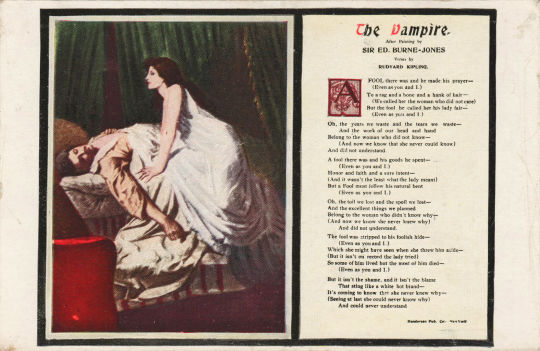
The Vampire, by Rudyard Kipling
This poem was written in response to the painting you see there, by Philip Burne-Jones (not Edward as it says in the image, but Edward’s lesser-known son), which shows a woman as the vampire -- very much in the gothic tradition that was the focus of season 10 (the Steins, the Werther Project, Don Quixote etc).
It’s this line -- “a rag and a bone and a hank of hair” -- that the title of this episode reminds me of, not only because it’s in the poem, but because it was the title of a Fiske novel with very similar themes to both Kipling’s poem and "Twigs & Twine & Tasha Banes.”
A fool there was and he made his prayer
(Even as you and I!)
To a rag and a bone and a hank of hair
(We called her the woman who did not care),
But the fool he called her his lady fair
(Even as you and I!)
Oh the years we waste and the tears we waste
And the work of our head and hand,
Belong to the woman who did not know
(And now we know that she never could know)
And did not understand.
A fool there was and his goods he spent
(Even as you and I!)
Honor and faith and a sure intent
But a fool must follow his natural bent
(And it wasn't the least what the lady meant),
(Even as you and I!)
Oh the toil we lost and the spoil we lost
And the excellent things we planned,
Belong to the woman who didn't know why
(And now we know she never knew why)
And did not understand.
The fool we stripped to his foolish hide
(Even as you and I!)
Which she might have seen when she threw him aside --
(But it isn't on record the lady tried)
So some of him lived but the most of him died --
(Even as you and I!)
And it isn't the shame and it isn't the blame
That stings like a white hot brand.
It's coming to know that she never knew why
(Seeing at last she could never know why)
And never could understand.
Tell me that first verse isn’t a pithy encapsulation of Max’s arc this episode.
There’s two ways to read this poem. The first is the sexist reading that the Femme Fatale sucks a decent man dry of his worldly goods and then callously dumps him. The second reading, and the one I personally think Kipling was going for, is basically saying this attitude of male entitlement is predictable and stupid and has nothing much to do with the woman. The commentary in the brackets, in particular, makes me think this. It’s a major burn for the artist who did that painting in other words, but done with enough nuance that a gormless young man would probably not realise it.
Why am I spending so much time on this tangentially related poem?
Because I think we see four different iterations of the theme of the focus of male attention which is actually a figment -- a rag and a bone and a hank of hair, or twigs and twine as the case may be.
The first is obviously Max. He chooses to create a golem of his sister rather than live into the future alone, and damns himself in the process. There’s already been a lot of meta about how Max is a parallel for the brothers (Sam’s magic, Dean’s queerness, or love of bartenders and cars if you prefer) and their toxic codependency, so I won’t retread that. But let’s consider Alicia for a moment. There are parallels here too (Soulless Sam, Demon Dean). Is she a person? Does the vessel matter? What makes a person a person? And should she get a say in her life or death? After all, she’s the one that has to live as a golem. Does Max have any right to do that to her? (Cliff Notes: No, no he doesn’t.)
(As an aside: how much of Max’s choice was nature and how much nurture? Dean thought Tasha Barnes was a good mother, and yet Max made the same kind of codependent choice as the Winchesters in the end. Or was this simply bad judgement in the face of grief, which wouldn’t have happened if he'd had a friend with him?)
The second is Mary and Ketch. We see another “false women” in the shifter wearing Mary’s face, which then tellingly shifts to Ketch’s face, and then finally is replaced by Mary herself. Ketch feels he has a proprietary claim to Mary’s body, that supersedes her own rights and choices. This is the BMOL’s philosophy all over -- they couldn’t be less Team Free Will if they tried. Their agenda is to kill everything they don’t like, and the ends justify the means, even if the means produce no ends.
The third was given to us last episode: Kelly. She’s a broodmare, a disposable womb that Lucifer covets as a means to an end. Rosemary, complete with baby, and we all know how that ended. Rosemary’s Baby is, after all, a parable of women’s enslavement to motherhood under patriarchy, in which she has no say in her impending motherhood.
And finally, we have Castiel. An angel in a human vessel, object of Dean’s intense concern, and receiver of valuable mixtape gifts.
Yes, one of these things is not like the others. But consider this. Dean and Sam’s solution to the threat that the nephilim potentially poses was to strip it of half its identity. It’s not allowed to be human and angel, it has to be one or the other to be “safe” and allowed to live.
Soooooo, conversion therapy or death? They are the options? That is supposedly the better way?
(As an aside, my comments here are not taking a stance on the ethics of real-world abortion. I’m pro-choice. I would have liked if the text explored the question of abortion from Kelly’s perspective in more depth, but it hasn’t, and the nephilim is clearly now showing agency, so the ethics have changed.)
Something I have long been interested in is the conversation in fandom about how Castiel should get to “choose Humanity” rather than having the choice made for him. There is something appealing about this notion, but I have always wondered, why must he choose? Can he not be both? Is that an invalid choice? Does he have to be human to belong in the Winchester family? Can’t he be loved for who is already is?
In other words... are people not allowed to be bi in the Supernatural ‘verse?
Because, you know, that question is relevant to my interests.
With that concern on the table, I come back to the idea of the “rag and a bone and a hank of hair.” Does Dean project his feelings onto Castiel the way Max/Ketch/Lucifer have been projecting them onto women? Does he expect things of Castiel he’s never actually asked for? Does he really understand what Castiel wants from Dean, or does Dean only think of the relationship in terms of what he wants himself?
I think that’s a pretty interesting set of questions, don’t you? I’d like to think the answer is no. I’m not so sure, though. Dean’s performance of masculinity/family has kind of gummed up the emotional works pretty well over the years. How far are we from the point at which he’s ready to let it go, and shift his relationships to a better way as well? He’s come a long, long way this season, but is he ready to know and be known?
I do think this may be the direction in which the climax is heading -- the characters allowing themselves to be known.
I hope so.
Previously:
The Ministry of Information vs Wayward Sons Carrying On (12x01)
My, my, how can I resist you? (12x02) and follow-up about Bohemian Raphsody
So what am I so afraid of? (I think I love you) (12x03)
I’ve got the joy, joy, joy, joy Down in my heart (Where?) (12x04) and a follow-up about the codependency and about Dean’s self-flagellation and issues with space
There can be only one! (12x05), and a follow-up conversation with elizabethrobertajones on Freud vs Schwartz.
They shall fall by the sword: they shall be a portion for foxes (12x06)
Presenting the Immaculate Heart Reunion Tour (12x07)
I’m still living the life where you get home and open the fridge and there’s half a pot of yogurt and a half a can of flat Coca-Cola. ~Alan Rickman (12x08, 12x09)
When the sons of God came in unto the daughters of men (12x10)
in re (12x11)
Making the most of teachable moments (12x12) and an added thought, In-and-out-laws
Don’t fuck with the branches on my family tree (12x13)
To Protect and to Serve (12x14) and some more thoughts
Hiding in the shadow of love (12x15) and some further thoughts in response to @elizabethrobertajones‘ meta.
You’re living in the past, it’s a new generation (12x16)
I’m still the same old me, that’s all I’ll ever be (12x17 and 12x18)
#supernatural#meta#season 12#spoilers#dean winchester#mary winchester#castiel#kelly#nephilim#themes#allusions#love as strong as death#family#ketch#banes#trigger#sexism#racism#suicide#abortion
51 notes
·
View notes